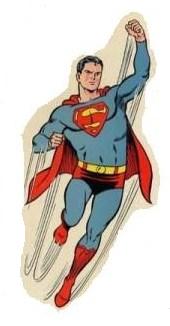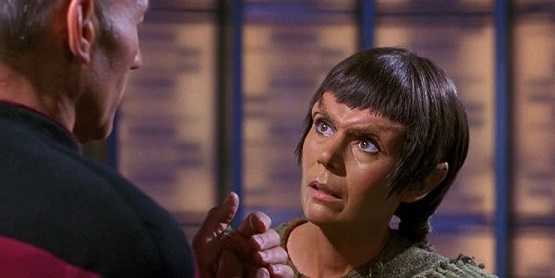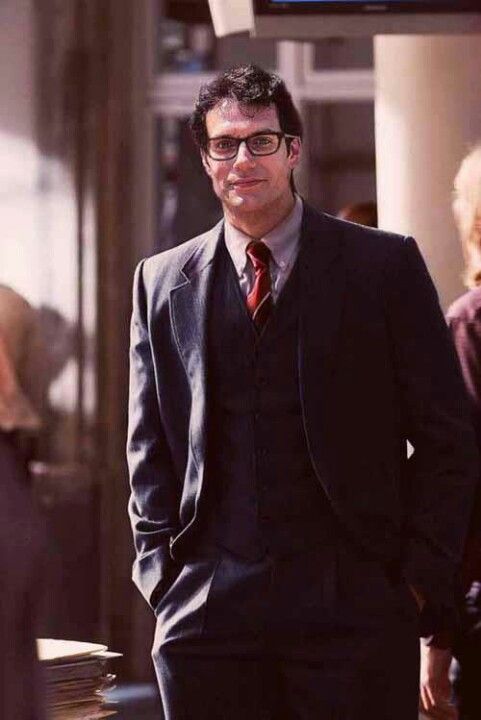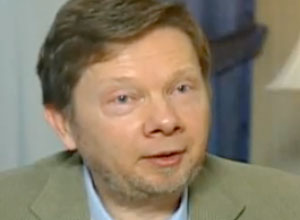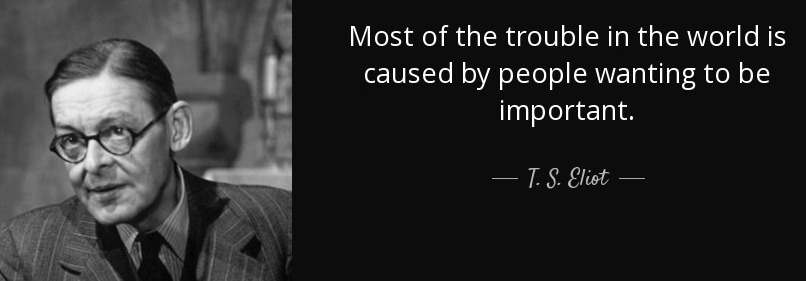|
home | what's new | other sites | contact | about |
|||||||
|
Word Gems exploring self-realization, sacred personhood, and full humanity
Leadership
"All [demagogic] leaders strive to turn their followers into children... The frustrated follow a leader less because of their faith that he is leading them to a promised land than because of their immediate feeling that he is leading them away from their unwanted, spoiled selves." Eric Hoffer
Editor's 1-Minute Essay: Leadership & Decision-Making Editor’s Essay: What does it mean to be a great man or woman? Eckhart Tolle: When You Don't Know What To Do Peter Drucker: More Doing than Dash John Arnold: Make Up Your Mind: Decision-Making as Science Thomas Stewart: How To Think With Your Gut James Surowiecki: Mass Intelligence: Crowds Do A Better Job of Decision-Making Than Individuals Paul Johnson: What Great Statesmen Have To Teach Us
Editor’s note: I came across some advice from a leading CEO on how to run corporate meetings. He said that these need to be structured so that the newest hiree is not only given forum to speak but, if his input is worthy, might effect change in the company. Further, the CEO said, he himself always spoke last at the meeting so as not to put a damper on the views of others. All of this egalitarianism codifies the truth that wisdom is where you find it, and not necessarily in top-down authority. If an organization is run in a cultish manner, worshipping the words of Dear Leader, then all discussion will revolve about “what did Dear Leader mean when he said such-and-such,” with the stultifying inbred assumption that truth will die with him. This is how organizations fail to thrive.
Byron and Catherine Pulsifer, Leadership vs. Management: "By attempting to manage people you are limiting their potential." Stanley Kubrick: “If you can talk brilliantly about a problem, it can create the consoling illusion that it has been mastered.” Albert Einstein: "Problems cannot be solved at the same level of awareness that created them... We cannot solve our problems with the same thinking we used when we created them." Carl Jung: "The greatest and most important problems in life are all in a certain sense insoluble. They can never be solved, but only outgrown." Barbara Colorose: "If you can't solve it, it's not a problem--it's reality."
Brand Blanchard: "[How to think about a problem:] The first step is to make the problem specific... The second step is to form theories freely of how to rid yourself of that burden... The third step is to develop in foresight the consequences of your proposals... The fourth and final step in thinking is to compare the consequences of your proposals to see which is best in the light of your scheme of life as a whole... Whether you choose a vacation or a spouse, a party or a candidate, a cause to contribute to or a creed to live by -- think!" Voltaire: "No problem can stand the assault of sustained thinking." Stanley Arnold: "Every problem contains within itself the seeds of its own solution."
The following is reprinted from the "afterlife #31.stead" page:
H.L. Mencken: "For every complex problem, there is a solution that is simple, neat, and wrong." G. K. Chesterton: "It isn't that they can't see the solution. It's that they can't see the problem." John F. Kennedy: "Let us not seek the Republican answer or the Democratic answer, but the right answer. Let us not seek to fix the blame for the past. Let us accept our own responsibility for the future." Albert Einstein: "The mere formulation of a problem is far more essential than its solution, which may be merely a matter of mathematical or experimental skills. To raise new questions, new possibilities, to regard old problems from a new angle requires creative imagination and marks real advances in science." John F. Kennedy, American University, June 10, 1963: "Our problems are man-made, therefore they may be solved by man. And man can be as big as he wants. No problem of human destiny is beyond human beings."
Jim Rohn: "To solve any problem, here are three questions to ask yourself: First, what could I do? Second, what could I read? And third, who could I ask?" R. Buckminster Fuller: "When I'm working on a problem, I never think about beauty. I think only how to solve the problem. But when I have finished, if the solution is not beautiful, I know it is wrong." Zeeman, E. Christopher, Catastrophe Theory, 1977: "Technical skill is mastery of complexity while creativity is mastery of simplicity." Ramona E. F. Arnett: "The perception of a problem is always relative. Your headache feels terrific to the druggist." Malcolm Forbes: "It's so much easier to suggest solutions when you don't know too much about the problem." John Galsworthy: "Idealism increases in direct proportion to one's distance from the problem." Calvin Coolidge: "Nothing in the world can take the place of persistence. Talent will not; nothing is more common than unsuccessful people with talent. Genius will not; unrewarded genius is almost a proverb. Education will not; the world is full of educated derelicts. Persistence and determination alone are omnipotent. The slogan 'press on' has solved and always will solve the problems of the human race." Richard Sloma: "Never try to solve all the problems at once -- make them line up for you, one-by-one." Thomas J. Peters and Robert H. Waterman, Jr.: "Do it, fix it, try it, is our favorite axiom... 'chaotic' action is preferable to orderly inaction... The most important and visible outcropping of the action bias in the excellent companies is their willingness to try things out, to experiment." Warren Bennis, New York Times, 2/17/02: "Unlike top management at Enron, exemplary leaders reward dissent. They encourage it. They understand that, whatever momentary discomfort they experience as a result of being told they might be wrong, it is more than offset by the fact that the information will help them make better decisions." Phyllis Bottome: "There are two ways of meeting difficulties: You alter the difficulties or you alter yourself to meet them." Roger Lewin: "Too often we give our children answers to remember rather than problems to solve." George F. Nordenbolt: "No matter how big and tough a problem may be, get rid of confusion by taking one little step toward a solution. Do something." Dr. Gary E. Schwartz, The AfterLife Experiments: "How can you prove to anyone that you love your husband or wife, a child, a friend, a pet? Not by what you say--people often lie to protect themselves or others. Not by what you do--we all do some things because they're expected of us rather than because we truly want to do them... there is no substitute for having the experience of love--or, for that matter, any other experience. One must ultimately have the experience for oneself. Everything else is indirect--a process of inference, of interpretation. But the deep question arises, how do we know whether the interpretation of our personal experiences is genuine? ... it's difficult to determine whether what we interpret to be love is actually love... Fortunately, just because something is difficult doesn't make it impossible... Scientific exploration begins by forming a hypothesis, and then gathering evidence that will support it or will prove it false. We started with the hypothesis, the working assumption, that science can establish that love exists, that consciousness exists, and that survival of consciousness exists, in the same way that science has established that gravity exists, that electrons exist, and that photons from 'deceased' stars continue to exist... Physics teaches us that it's scientifically appropriate to infer the existence of invisible processes through careful observation in repeated experiments. Just as we scientifically infer the existence of an invisible force termed gravity through the systematic and careful observations of objects falling to the ground, our hypothesis said that one can scientifically infer the existence of invisible living info-energy systems -- living souls and spirits -- through systematic and careful experimentation." Ronald Reagan: A Time for Choosing (1964), the speech that launched his political career: "I have spent most of my life as a Democrat. I recently have seen fit to follow another course. I believe that the issues confronting us cross party lines." Marshall Loeb: Why Harry S Truman is The President We Want Now: "He made more decisions that changed the course of history than any other president. Had he not occupied the office, America's story would have been quite different, and not nearly as ennobling or successful." Paul Johnson: Heroes: What Great Statesmen Have to Teach Us: "... the ability to see the world clearly, and to draw the right conclusions from what is seen, is the foremost lesson which great men and women of state have to teach us." Ronald Reagan, 1975: "Our people look for a cause to believe in. Is it a third party we need, or is it a new and revitalized second party, raising a banner of no pale pastels, but bold colors, which make it unmistakably clear where we stand on all of the issues troubling the people?" Timothy Gallwey, The Inner Game of Tennis: "Uncertainty is the most difficult thing about decision-making. In the face of uncertainty, some people react with paralysis, or they do exhaustive research to avoid making a decision. The best decision-making happens when the mental environment is focused. In a physical environment, you focus on something physical. In tennis, that might be the spinning seams of the ball. In a mental environment, you focus on the facts at hand. That fine-tuned focus doesn't leave room for fears and doubts to enter. Doubts knock at the door of our consciousness, but you don't have to have them in for tea and crumpets." Dwight D. Eisenhower: "I find that planning is almost useless - but planning is essential." JFK, the movie, Thirteen Days: "There is something immoral about abandoning your own judgment." Charles Varlet De La Grange: "When we ask advice, we are usually looking for an accomplice." Albert Einstein: "Common sense is the collection of prejudices acquired by 18." Mahatma Gandhi: "All compromise is based on give and take, but there can be no give and take on fundamentals. Any compromise on mere fundamentals is a surrender. For it is all give and no take." Mark Twain: “We should be careful to get out of an experience only the wisdom that is in it and stop there; lest we be like the cat that sits down on a hot stove-lid. She will never sit down on a hot stove-lid again and that is well; but also she will never sit down on a cold one either.” Woodrow Wilson: "I would rather fail in a cause that someday will triumph, than to win in a cause that I know will someday fail." Johann Wolfgang von Goethe (1749-1831): “Treat a man as he is and he will remain as he is. Treat a man as he can and should be and he will become as he can and should be.” Thomas Sowell: "It is hard to imagine a more stupid or more dangerous way of making decisions than by putting those decisions in the hands of people who pay no price for being wrong." Edward Abbey: "Grown men do not need leaders." Harry S Truman (a saying adopted by Ronald Reagan): "It is amazing what you can accomplish if you do not care who gets the credit." President Ronald Reagan, May 22, 1985, speaking at the U.S. Naval Academy: "Many good men gave their lives in the 1940s for America's unwillingness to prepare in the 1930s. Let me promise you: as long as I am President, that will not happen again." Samuel Eliot Morison on the hero of the Battle of Midway, Admiral Raymond Spruance: "Power of decision and coolness in action were perhaps Spruance's leading characteristics. He envied no one, rivaled no man, won the respect of almost everyone with whom he came in contact, and went ahead in his quiet way, winning victories for his country....When we come to the admirals who commanded at sea, and who directed a great battle, there was no one to equal Spruance. Always calm, always at peace with himself, Spruance had that ability which marks the great captain to make correct estimates and the right decisions in a fluid battle situation... Spruance in the Battle of the Philippine Sea, overriding Mitscher the carrier expert in letting the enemy planes come at him instead of going in search of them, won the second most decisive battle of the Pacific war. And, off Okinawa, Spruance never faltered in face of the destruction wrought by the kamikazes. It is regrettable that, owing to Spruance's innate modesty and his refusal to create an image of himself in the public eye, he was never properly appreciated." Says Michael D. Hull: "About his intellect he was equally unpretentious: 'Some people believe that when I am quiet that I am thinking some deep and important thoughts, when the fact is that I am thinking of nothing at all. My mind is blank.'" Ken Oshman: "The interesting thing is that there are so few important decisions. You don't have to go in the 'right' direction. You don't have to enter the 'right' business. What you have to do is have made a decision as to what you're going to do and then you just have to figure out how to succeed at it." Peter Robinson: "Sometimes during the two-year curriculumn, every MBA student ought to hear it clearly stated that numbers, techniques, and analysis are all side matters. What is central to business is the joy of creating." Mike Huber: "I never, ever say 'I can't' about anything. I might say 'I don't have the authority to make that decision' or 'Building A is too heavy for me to lift' or 'I will need training before I pilot that space shuttle.'" Dan Marino, Sr.: "The scoreboard can't make you a loser. If you walk off the field with your head up, you don't lose. You don't hang your head for nobody. People in the stands think you're the greatest or the worst -- their opinion doesn't make a difference. The only opinion that makes any difference is your own opinion of yourself. Nobody can make you a loser." Harvey B. Mackay: "Are you worried about pressure? I look at it this way: Pressure is having to do something you are not totally prepared to do." Max De Pree: "The greatest thing is, at any moment, to be willing to give up who we are in order to become all that we can be... The signs of outstanding leadership appear primarily among the followers. Are the followers reaching their potential? Are they learning? Serving? Do they achieve the required results? Do they change with grace? Manage conflict? ... We need to give each other the space to grow, to be ourselves, to exercise our diversity. We need to give each other space so that we may both give and receive such beautiful things as ideas, openness, dignity, joy, healing, and inclusion." W. Edwards Deming: "It is not enough to do your best; you must know what to do, and then do your best." Sir Barnett Cocks: "A committee is a cul-de-sac down which ideas are lured and then quietly strangled." Franklin D. Roosevelt, counseling Frances Perkins: "One thing is sure. We have to do something. We have to do the best we know how at the moment... If it doesn't turn out right, we can modify it as we go along." Richard Sloma: "Never try to solve all the problems at once - make them line up for you one-by-one." Thomas J. Peters and Robert H. Waterman, Jr.: "Do it, fix it, try it, is our favorite axiom. Karl Weick adds that 'chaotic action is preferable to orderly inaction' ... The most important and visible outcropping of the action bias in the excellent companies is their willingness to try things out, to experiment." General George Patton: "If you tell people where to go, but not how to get there, you'll be amazed at the results." A. Lincoln, remarks at Painesville, Ohio, February 16, 1861: "I have stepped out upon this platform that I may see you and that you may see me, and in the arrangement I have the best of the bargain." Maggie Gallagher, Jan. 8, 2002: "There are just two kinds of political leaders, as some wag put it: mommy pols and daddy pols... Mommies feel your pain. Daddies give you confidence that you can ignore the pain and get on with life." Theodore Roosevelt: "The best executive is the one who has sense enough to pick good men to do what he wants done, and self-restraint enough to keep from meddling with them while they do it." Sir John Hoskyns: "Strategic leadership requires one other skill. It is a readiness to look personally foolish; a readiness to discuss half-baked ideas; since most fully baked ideas start out in that form; a total honesty, a readiness to admit you got it wrong." Oliver Cromwell (1599-1658): "Do not trust the cheering, for those persons would shout as much if you or I were going to be hanged." [He was the son of a knight, well-educated at his local grammar school in Huntingdon and at university in Cambridge, a lawyer, businessman-farmer and MP.The disputes which led to the English Civil War were about the rule of law, the power of the church and the absolute rule of the monarchy. In short, the debate was about where power lay - with Parliament or with the Crown.The clash resulted in five years of bloody civil war, the beheading of a defeated king who would not come to terms, and the rule of the Lord Protector: Oliver Cromwell. The Crown was offered to him. But he refused, and remained Protector until his death in 1658.] Editor's note (9-8-02): The movie Beautiful Mind provides a useful metaphor regarding decision-making. John Nash is plagued by the "demons" of imaginary friends scolding him, prompting him to various untoward activities. Quite real to Nash, these unwelcomed advisors cause their victim a great deal of anguish. Nash defeats them with logic: after years of torment he notices that his nemeses have not aged at all while Nash himself has grown old. This insight, despite Nash's mental torment, finally registers with and is accepted by him, allowing Nash greater mental-health recovery. It occurred to me that in decision-making, one is often plagued by "bad feelings" toward a certain course of action, even when that course has passed all of the tests of good sense and wise judgment. While there is great truth in the saying that one ought to "trust" one's "organism," it is also true that there comes a time when undefined "bad feelings" must be disowned, recognized for what they are, fear-inspired ghosts of past traumas and failures; one's best decision, in a difficult arena, must not be allowed to be hijacked and held hostage, indefinitely, to radical subjectivity in the presence of healthy intuition, superior logic, and tested principles. Anthony Robbins: "It's in your moments of decision in which your destiny is shaped." Vince Lombardi: "Teamwork is what the Green Bay Packers were all about. They didn't do it for individual glory. They did it because they loved one another." Ben Graham, counseling Warren Buffett: "You are neither right nor wrong because the crowd disagrees with you. You are right because your data and reasoning are right." Dick Morris, speaking of Presidential candidate, General Wesley Clark, Oct. 21, 2003: "Clark's managers, veterans of the 1992 Clinton run, are like the generals of France, who enter each war perfectly prepared to win the last one." Robert Hagstrom, The Warren Buffett Way: "The most important management act is the allocation of the company's capital... Allocation of capital, over time, determines shareholder value. Deciding what to do with the company's earnings -- reinvest in the business or return money to shareholders -- is, in Buffett's mind, an exercise in logic and rationality." Time, Jan. 5, 1968: "In 1846, Abraham Lincoln's friends raised a mere $200 to finance his race for Congress. After he won, Lincoln returned $199.25: he had canvassed the voters on his own horse and spent only $0.75 to treat some farm hands to a barrel of cider." Alfred North Whitehead: "A great society is one whose men of business think greatly of their functions." Jenkin Lloyd Jones: "The vision of things to be done may come a long time before the way of doing them becomes clear; but woe to him who distrusts the vision." Gordon W. Prange, At Dawn We Slept: The author describes Japanese fleet admiral Nagumo's chief of staff, Kusaka, just before the Pearl Harbor attack: "Kusaka wrapped himself in his usual kimono of ascetic calm, believing that at times the individual becomes caught up in problems he cannot solve by his own efforts. He thought that by concentrating on the immediate task to the exclusion of fruitless worries and speculations, the human being could tap a pure stream of spiritual strength to carry him through." Elbert Hubbard: "There is something much more scarce, something finer far, something rarer than ability. It is the ability to recognize ability." Kenny Rogers, The Gambler: "Son, I've made a life out of readin' people's faces. Knowin' what the cards were by the way they held their eyes. So if you don't mind my sayin', I can see you're out of aces... If you're gonna play the game, boy, you gotta learn to play it right. You've got to know when to hold 'em, know when to fold 'em Know when to walk away, know when to run. You never count your money when you're sittin' at the table. There'll be time enough for countin' when the dealin's done. Every gambler knows that the secret to survivin' is knowin' what to throw away and knowin' what to keep.'Cause every hand's a winner and every hand's a loser..." Editor's note: Every hand of cards is a winning hand if one knows how to play it. Nikita Khrushchov, 1960: "President Roosevelt proved that a President could serve for life. Truman proved that anyone could be elected. Eisenhower proved that your country can be run without a President." Thomas Jefferson: "I served with General Washington in the legislature of Virginia before the Revolution, and during it with Dr. [Benjamin] Franklin in Congress. I never heard either of them speak 10 minutes at a time, nor to any but the main point that was to decide the question. They laid their shoulders to the great points, knowing that the little ones would follow of themselves." Robert Fulford's review of Paul Johnson's A History of the American People: "While crossing the great divide of the 1960s [Johnson] works up a little anger over the creation of John Kennedy's political career, 'one of the biggest frauds in American political history,' which involved everything from the ghost-writing of his college thesis to the cash purchase of votes. But of all post-1950 presidents, the one who fascinates Johnson most is that amazing piece of work, Dwight Eisenhower, the president from 1953 to 1961, who talked in a woolly gobbledegook and pretended to be dim while outsmarting everyone. Robert Taft, Eisenhower's rival for the Republican nomination, said, 'I really think he should have been a golf pro.' Eisenhower of course rolled over Taft, as earlier he had rolled over Bernard Montgomery, George Patton, and other fractious generals under his Second World War command, and as he later rolled over Adlai Stevenson and Joseph McCarthy, who in different ways challenged his political power in the 1950s. Eisenhower presented himself as amiable but lazy by having his press secretary release every day an account of his schedule that omitted, over the years, hundreds of crucial meetings--a deception that was revealed when his office logs were studied decades later. During most of his years in office he made it appear that John Foster Dulles was running foreign policy and Sherman Adams was running everything else. Even Dulles and Sherman sometimes thought so at the time, but the record shows that Eisenhower kept both of them, and everyone else, on a short leash. In describing this process, Johnson gives political science and management studies what I believe is a new phrase: 'He practiced pseudo-delegation.' Eisenhower fooled everyone--well, almost everyone. His vice-president, Richard Nixon, whose opinion on this point deserves respect, called him 'the most devious man I ever came across in politics.' Johnson's account of Eisenhower's career reminds us how much can be accomplished in stealth by someone who is not anxious to appear clever. It also demonstrates that we should never assume we know what is happening inside a government at the time it is governing: perhaps politics, like life, can only be understood in retrospect." Editor's note: It’s been said, “Back East, they try to fool you by saying more than they know; and out West, they try to fool you by saying less than they know.” Eisenhower, the favorite son of Kansas, fooled most everyone, including Nikita Kruschev who once remarked that the D-Day Mastermind, with his apparently lazy golfing-day ways, proved that Americans did not need a President. All of this public posturing should stand as warning to us: we are all familiar with history's ego-maniac leader-types, ones who love the applause of the crowd - but, potentially far more dangerous, because they are clear-headed, are those who care nothing for the laudations of men; those who have no ego to be stroked; those who, with cunning calculation, cherish power. Such leaders, if altruistically motivated, can be incredibly effective - but, heaven help us if these political-stealth-bombers turn against us. Dwight D. Eisenhower: When asked if he knew Douglas MacArthur, he responded: "Oh, yes. I studied dramatics under him for 12 years." Harry S Truman, April, 1951: Speaking of MacArthur: "I don't want that son-of-a-bitch resigning on me. I want him fired." Warren Bennis: "Leadership is the capacity to translate vision into reality." Woodrow Wilson: "I not only use all the brains I have but all the brains I can borrow." Warren Buffett on John Maynard Keynes: "Keynes said in his masterful The General Theory: 'Worldly wisdom teaches that it is better for reputation to fail conventionally than to succeed unconventionally.' (Or, to put it in less elegant terms, lemmings as a class may be derided but never does an individual lemming get criticized.)" Dick Morris, March 15, 2006: "As his ratings sink below 40 percent and he even loses his grip on the Republican base, President Bush faces a crucial test: To succeed in his final three years in office, he has got to work much, much harder at maintaining popularity than he is right now. To avoid lame-duck status, he has to manifest the same effort and maintain the same schedule in 2006, '07, and '08 that he did in '03 and '04. George W. Bush is not lazy; he works hard at the job of president. But not at the job of regaining his popularity - perhaps out of an old-school belief that popularity is for elections. But this mistakes the nature of modern American politics - where popularity is for every day, and those who lose it are destined to twist in the wind. If Bush doesn't get his act together and begin to work hard at building popular support, his self-indulgence will land him in ever-deeper misery. His ratings will stay stagnant; then he'll lose one or both houses of Congress - and spend his final two years in office dodging opposition bullets, subpoenas, perhaps even impeachment. It will mean personal misery for this good man, and leave a cloud on his legacy that will take years to erase. All because he doesn't want to do what he must - get up every day and go out and speak to America. President Bill Clinton kept his job rating over 60 percent through all the days of Monica and impeachment. It had nothing to do with a good economy; as Bush is finding out, a growing GDP doesn't guarantee growing approval ratings. Clinton went before the nation every day with a new speech, an executive order, a proposal, a bill signing or some other media event. He didn't just recycle his old proposals. Each day, he unearthed a new idea or initiative to keep his daily majority. He knew that without it, with an opposition Congress, he was a goner. His initiatives were widely varied: a rating system to help parents anticipate TV content; school renovations; clearing out decaying public housing projects; increased college scholarships; lower FHA closing fees; national databases for child abusers; anti-tobacco initiatives; expansion of family and medical leave; job creation for welfare mothers - the list was endless. An entire White House policy apparatus was charged with churning out the initiatives... Bush needs to tell his political team to start churning out events, as they did before the 2004 election, every day, every week, and every month. His presidency's future depends upon it. Bush cannot afford the self-indulgence of not working as hard as Clinton did to keep his daily majority." Geoffrey Colvin, Fortune, Why Dream Teams Fail, May 31, 2006: "Read the extensive literature on team effectiveness, or talk to people on teams in sports, business, or elsewhere, and it always comes down to this: Trust is the most fundamental element of a winning team. If people think their teammates are lying, withholding information, plotting to knife them, or just incompetent, nothing valuable will get done... In fact, trust is so fragile and so laboriously created that it may never extend very far in a top-level team. Building a really high-performing executive team at the highest level is a mirage. When such teams do exist, they'll consist mostly of two people, maybe three. It's just too hard to build trust more extensively at the top level, where everyone is supposedly a star... the legendary top executive teams are almost always pairs. Think of Roberto Goizueta and Donald Keough at Coca-Cola in the '80s and '90s, or Tom Murphy and Dan Burke at Capital Cities/ABC from the '60s to the '90s, or Reuben Mark and Bill Shanahan at Colgate-Palmolive for two decades until last year, or Warren Buffett and Charlie Munger at Berkshire Hathaway from the '60s to today... Maybe you noticed something else about those teams: Each consisted of a boss who became famous and a much less famous No. 2 who devoted his career to the success of the enterprise. In every case, though, they developed deep trust over many years and produced outstanding results." James Grant, John Adams: Party Of One: The author refers to the following incident: The brilliant 20-something John Quincy, in a series of 1791 newspaper articles, defended his father against the barbs of non-other than the stellar Thomas Jefferson - and won! "I confess, Sir, I am somewhat at a loss to determine what this very respectable gentleman means by political heresies. Does he consider this pamphlet [The Rights of Man] of Mr. Paine's as the canonical book of political scripture? As containing the true doctrine of popular infallibility, from which it would be heretical to depart in one single point? [If] Mr. Paine is to be adopted as the holy father of our political faith; and this pamphlet is to be considered the Papal Bull of infallible virtue, let us at least examine what it contains." Mohandas K. Gandhi: "Power is of two kinds. One is obtained by the fear of punishment and the other by acts of love. Power based on love is a thousand times more effective and permanent then the one derived from fear of punishment." Charles Adams: "There have been great and powerful men who have moved civilization, but most of the time no heroes can be found, and the world is led by scoundrels, fools, and second-stringers." General George S. Patton: "Lead me, follow me, or get out of my way... Never tell people how to do things. Tell them what to do and they will surprise you with their ingenuity... Prepare for the unknown by studying how others in the past have coped with the unforseeable and the unpredictable... Take calculated risks. That is quite different from being rash. My personal belief is that if you have a 50% chance, take it!"
Cicero: The wise are instructed by reason; ordinary minds by experience; the stupid by necessity; the brutes by instinct. Shimon Peres: "If a problem has no solution, it may not be a problem, but a fact - not to be solved, but to be coped with over time." Soren Kierkegaard: "Life is not a problem to be solved, but a reality to be experienced." R. Buckminster Fuller: "When I'm working on a problem, I never think about beauty. I think only how to solve the problem. But when I have finished, if the solution is not beautiful, I know it is wrong." J.P. Morgan: "No problem can be solved until it is reduced to some simple form. The changing of a vague difficulty into a specific, concrete form is a very essential element in thinking." |
|||||||
|
|
